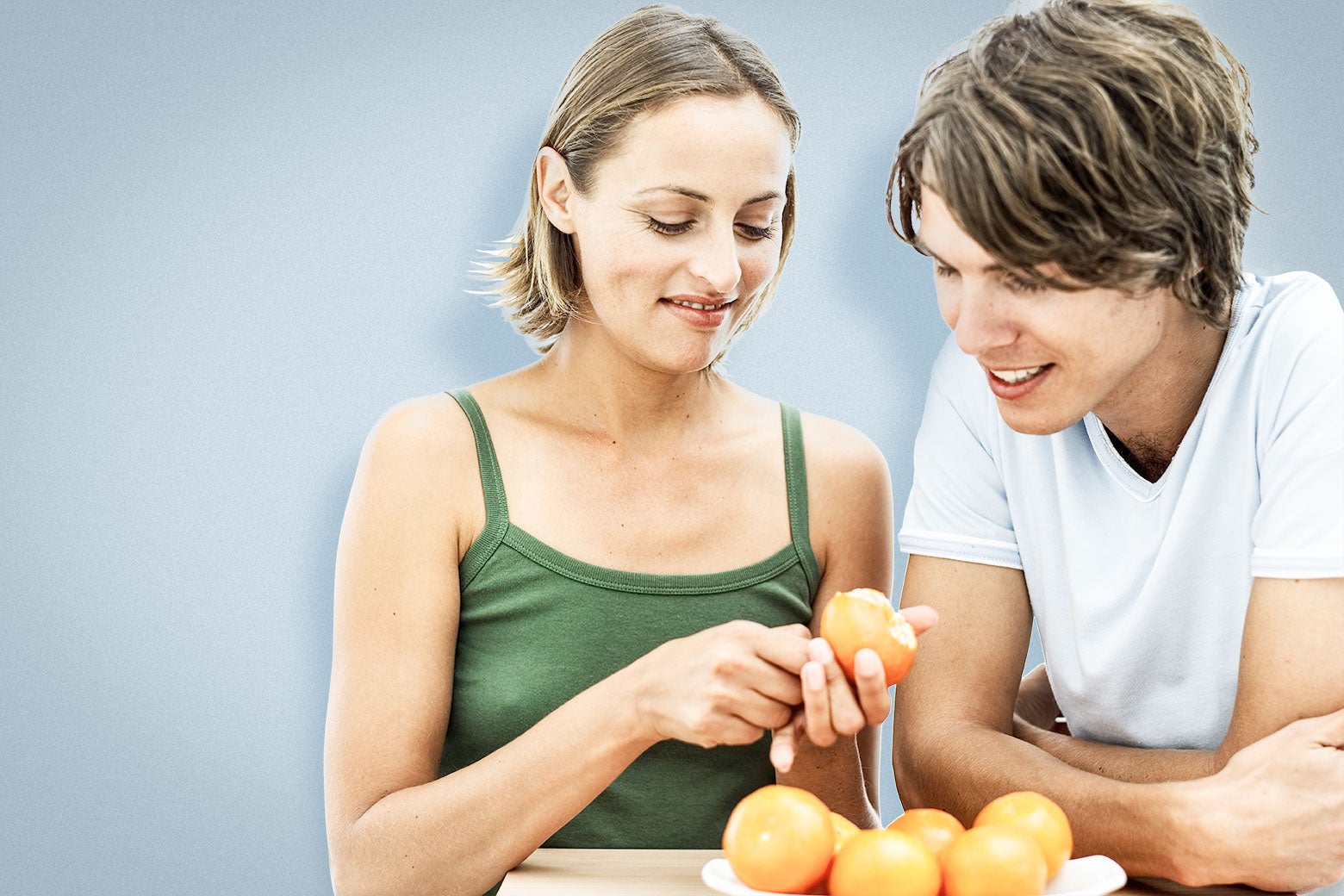Last November, a TikTokker who posts as @things.I.cant.sen uploaded a slideshow that purportedly reveals the melancholy text messages sent by two exes who clearly hadn’t spoken in a while. It’s your typical Viral Yearning Content—designed to summon ancient feelings in your own personal life—laden with clipped salutations and lingering heartache familiar to anyone who’s ever reconnected with an old flame. But there was one specific line in that slideshow that captured the attention of the internet, when one of the lovers fondly remembers how the other would peel their oranges for them in the morning. It’s one of those subtle acts of kindness that tend to smolder in memory, and also—as the TikTok racked up over 16 million plays—a helpful audit of our own romantic lives.
The orange-peel theory, as it is now known, is simple. If you asked a partner (or even a friend!) to peel an orange for you, would they do it or shoo you away? Peeling an orange, of course, does not take much effort and tends to be a basic motor function most humans develop by the age of 5. But that’s exactly the point: A caring soul would embrace this frivolous act of service and wash their hands of the juices afterward. In other words, sometimes we all feel like being babied. When our partners happily oblige, it says something about how much we can let our guard down and be cared for.
Naturally, TikTok is now filled mostly with women testing the orange-peel theory on their husbands and boyfriends, with some troubling results:
Of course, one does not need to be in possession of citrus in order to demonstrate the tiny, silly, and sometimes arbitrary ways you can care for a partner. The orange-peel theory is the manifestation of countless small, subconscious examinations we rely on when navigating a burgeoning relationship. That’s why I put the call out to social media, and my colleagues at Slate, to learn about their inversions on the theory. Bundled together, they serve as a standardized test for tenderness. Let’s hope we all pass.
Slate Senior Editor Isabelle Kohn believes you can tell a lot about someone by whether or not they'll let you use their body heat to warm your external appendages. True love is jutting your frigid toes into the crease between your partner’s thighs and the couch cushion and siphoning off their warmth without them pushing you away. "Will they withstand the pain?" said Kohn, who also values a partner who will happily make her a cup of tea that she could easily get up and make herself.
Sara Wakefield, a graphic designer in New York, takes all prospective first dates to a beloved dive bar that serves gigantic goblets of Budweiser for exactly three dollars. If they don't react with enthusiasm, said Wakefield, then their courtship is destined to not work out long term. ("One guy asked for a smaller glass to drink out of!")
Joanna Kinscherff, in Austin Texas, would occasionally test romantic partners by pretending something was mildly off with her food order. ("Huh, these fries are kinda cold.") If her date responded by being exceptionally rude to the waitstaff about her mild critique, then she knew the flirtation was already doomed. (In general, I received a lot of comments regarding the treatment of food service employees. Be nice out there.)
Susan Matthews, Slate's executive editor, likes it when her husband carries her skis for her, with the important note that skiing is more of her husband's hobby than hers. "If the other person in the relationship is doing 'your thing,' you can go out of your way to make it more fun for the person doing the thing they don't love," she said.
When Cassandra, who lives and works in California and asks to keep her last name private, wakes up parched in the middle of the night, she petitions her boyfriend to retrieve a glass of water for her. "He does it without any reservations," she said. It's the perfect way to test Orange Peel Theory at 3 a.m.
Holly Allen, a designer at Slate, appreciates it when someone returns a lent car to her with the gas tank full. (Alternatively, if you bring her vehicle back to her with the dial on E, she'll take that as a glaring red flag.)
Slate staff writer Heather Schwedel, meanwhile, looks for someone who will give up the better seat at a restaurant table. If we're feasting at a chair-and-booth situation, a kind soul will vacate the cushion.
Shannon Palus, Slate’s features editor, thinks it's a good idea to seek out people who are on good terms with their exes. They don’t necessarily have to still be friends with them, but they must “speak kindly about them.” It is nice to know that those around us can see the forest for the trees, even in the midst of a major disagreement.
And speaking for myself, I often walk to the corner bodega after dinner—usually around 8 p.m.—so I can buy a treat for my fiancée. Usually this constitutes a tiny cup of Ben & Jerry's ice cream, which is the perfect way to remind you that life isn't so bad.
May we all continue to peel oranges for our loved ones, in all of our own unique ways.
